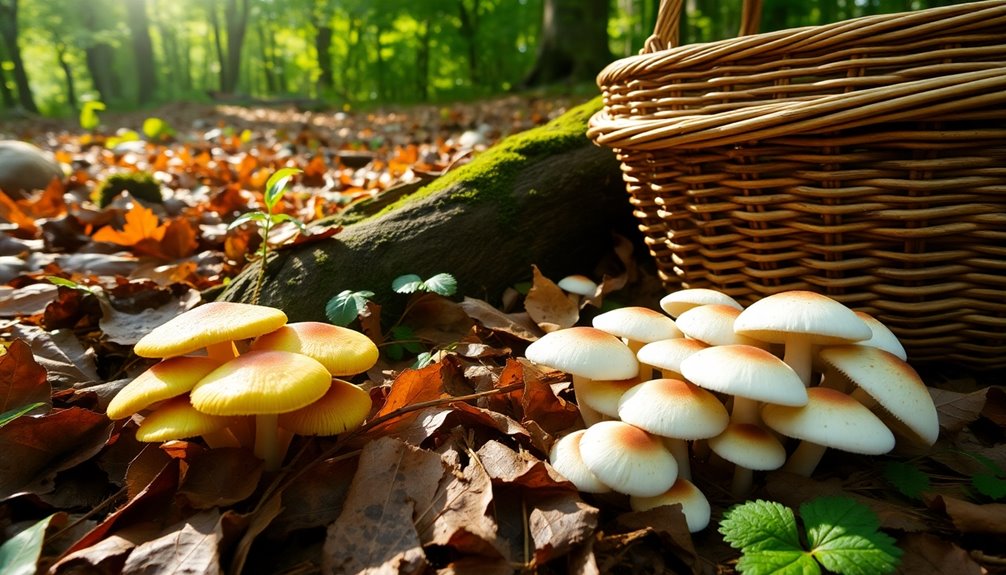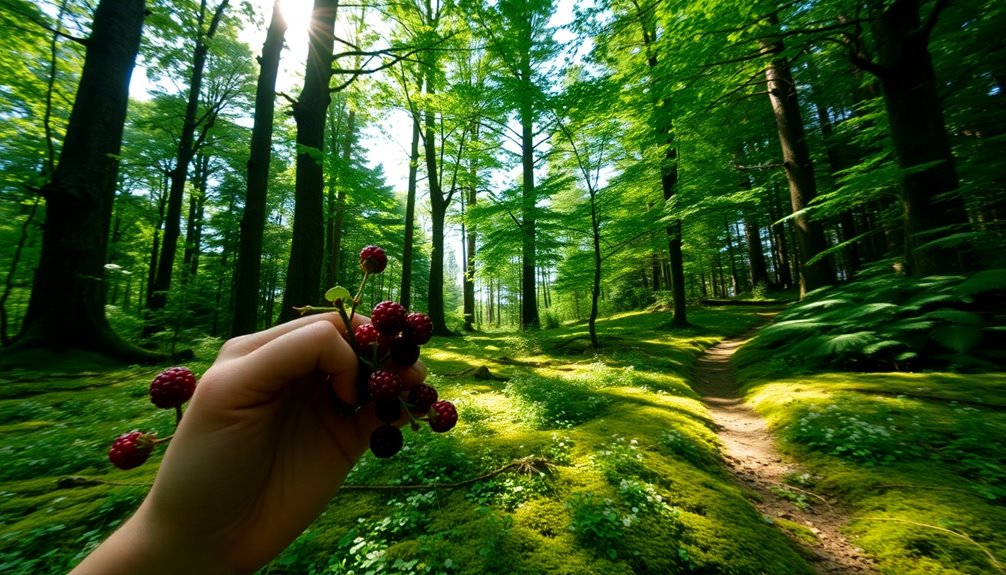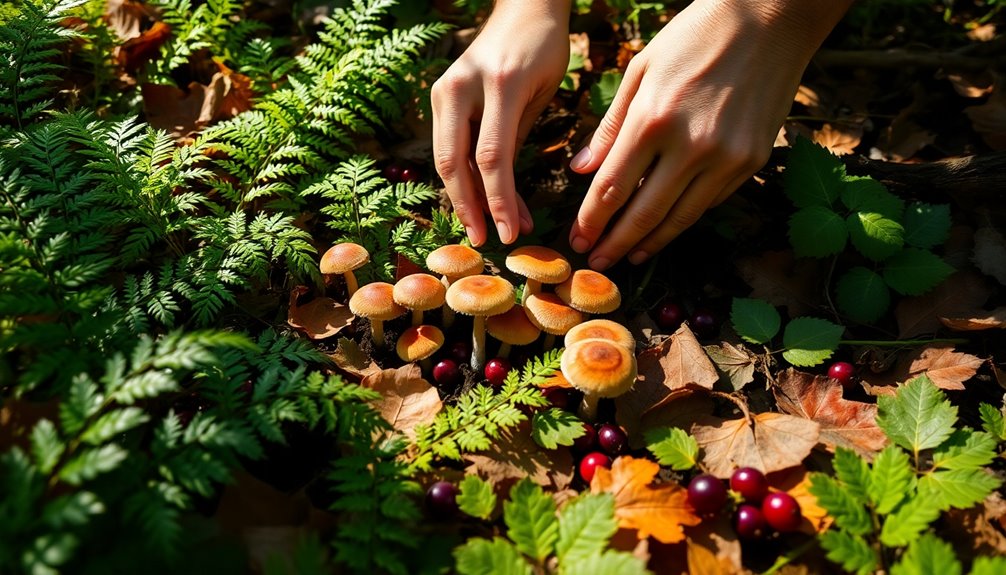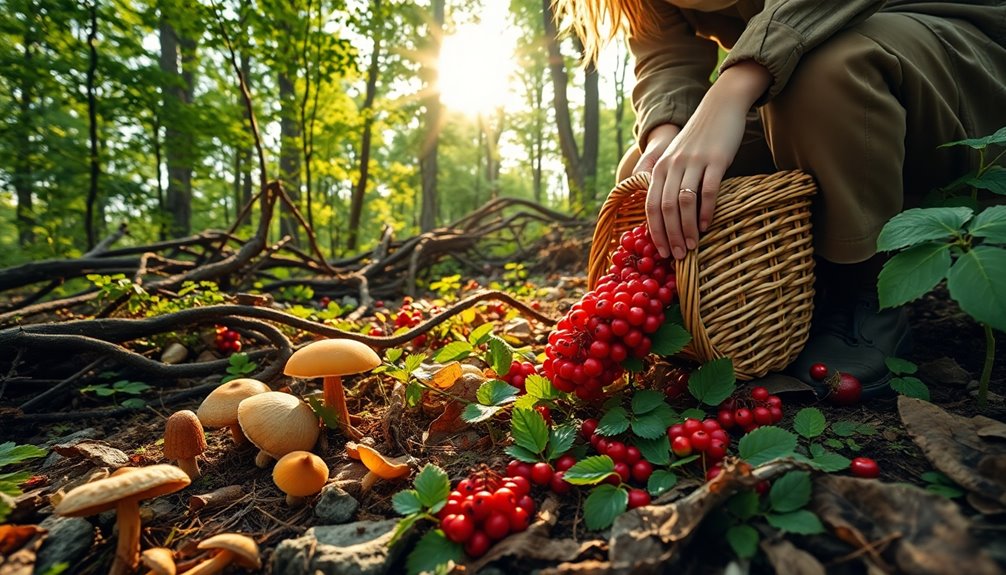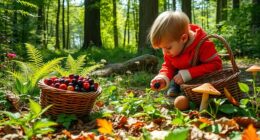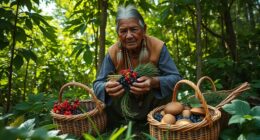Foraging is important because it brings a host of surprising benefits you might not expect. It boosts your health by providing nutrient-rich foods while connecting you to nature, which can reduce stress. You also get to enjoy unique flavors and culinary creativity with fresh, wild ingredients. Economically, foraging can save you money on groceries and even let you earn extra cash by selling surplus finds. Plus, it strengthens community ties and promotes mental well-being through shared experiences. Discover how foraging can transform your lifestyle by uncovering even more benefits that await you!
Key Takeaways
- Foraging enhances dietary diversity by providing access to nutrient-rich wild foods high in vitamins, minerals, and antioxidants.
- It supports environmental sustainability by promoting biodiversity and reducing the carbon footprint associated with food transportation.
- Foraged ingredients offer unique flavors and freshness, enhancing culinary experiences and encouraging creativity in cooking.
- Engaging in foraging fosters community connections and boosts mental well-being through shared experiences and time spent in nature.
- Foraging can significantly lower grocery expenses, promoting self-sufficiency and resourcefulness in food sourcing.
Health Benefits of Foraging

Exploring the great outdoors while foraging not only connects you with nature but also offers numerous health benefits. By gathering edible wild plants, you tap into a rich source of vitamins, minerals, and antioxidants that often surpass those found in cultivated foods. This boost in nutrition can greatly improve your overall health while supporting your executive function, which is essential for self-regulation and decision-making. Additionally, understanding the foraging range of local species can help you identify the most abundant and nutritious plants available in your area. For instance, certain foraged foods are known to be rich in antioxidants, which can combat oxidative stress and support immune health.
Foraging also encourages physical activity. As you walk and explore different environments, you enhance your cardiovascular health and promote physical well-being. It's a fun way to stay active while enjoying the beauty of nature.
Moreover, spending time outdoors has a profound impact on your mental health. Engaging with nature while foraging can reduce stress, anxiety, and depression, leading to improved emotional well-being. The calming effects of nature combined with the joy of discovering wild edibles create a perfect recipe for mental rejuvenation.
Additionally, foraged foods are high in fiber, supporting your digestive health and gut microbiome balance. Initial findings from the Wildbiome™ Project even suggest that foragers might experience better gut health scores, highlighting the potential benefits of a foraged diet. In regions like Michigan, foraging also allows you to discover over 300 species of edible plants, enhancing your connection to local biodiversity.
Embrace foraging, and you'll enjoy both physical and mental health advantages.
Unique Culinary Experiences

While reaping the health benefits of foraging, you'll also discover an exciting world of unique culinary experiences. Foraged foods, like wild strawberries and mushrooms, often boast flavors that far surpass those of cultivated varieties. Imagine how these vibrant tastes can elevate your meals and inspire you to explore new culinary horizons. Additionally, many foraged ingredients provide essential nutritional balance that enhances your overall diet, much like traditional dishes that utilize local ingredients in Brazilian cuisine. For instance, incorporating breakfast crepes made with foraged fruits can create a delightful twist on a classic dish.
The diversity of wild edibles encourages your creativity in the kitchen. You'll find yourself experimenting with ingredients that aren't typically found in grocery stores, leading to innovative dishes that showcase nature's best flavors. Taste testing these wild foods deepens your appreciation for the distinct profiles they offer, enriching your overall enjoyment of cooking and dining. Incorporating foraged herbs like hibiscus and rosehip can also enhance your dishes while promoting skin elasticity.
Moreover, foraging allows you to revive traditional recipes using foraged ingredients, connecting you to culinary heritage and forgotten flavors. This journey not only enhances your cooking repertoire but also introduces uncommon elements to your everyday meals. Engaging with foraged ingredients can also support foundational learning in science about local ecosystems and sustainable practices.
Embracing foraged foods transforms your culinary landscape, offering a unique blend of freshness and creativity that you won't find anywhere else. So, grab your basket and venture into nature—an unforgettable culinary adventure awaits!
Freshness and Organic Quality
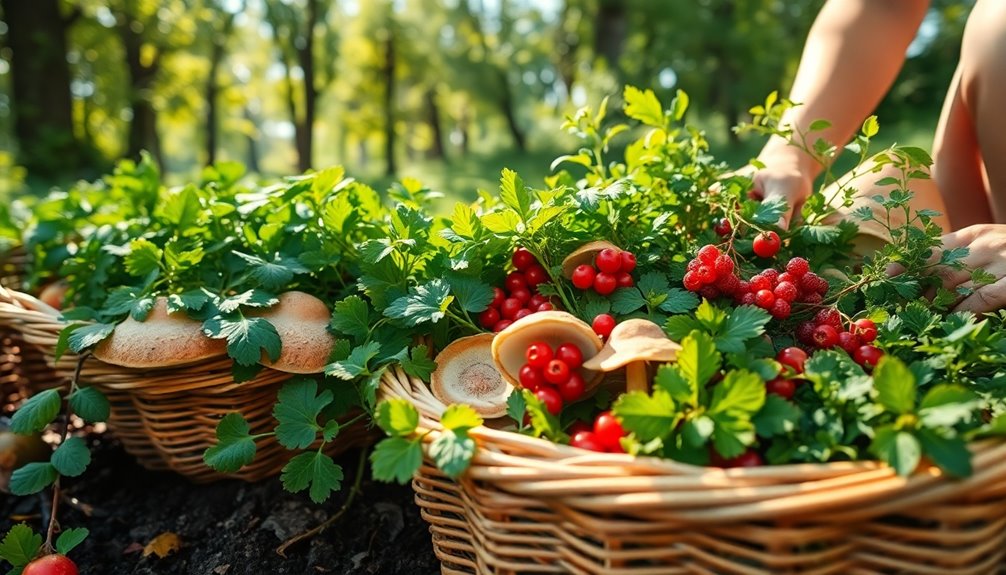
When you forage for food, you're picking it at its peak ripeness, ensuring maximum flavor and nutrition.
Unlike store-bought options, these wild edibles come from a chemical-free environment, making them 100% organic.
This means you not only enjoy fresher taste but also reap the health benefits that come with nutrient-dense ingredients.
Peak Ripeness Harvesting
At the height of the growing season, foraging offers you the chance to harvest foods at their peak ripeness, ensuring they burst with flavor and nutrition.
When you forage for wild foods, you're accessing edible species that have matured naturally in their habitats, free from artificial interventions. This means you're not just getting fresher produce; you're also enjoying the health benefits that come with it. For instance, some wild foods can provide antioxidants that help combat oxidative stress. Additionally, many wild foods, like certain berries, contain high levels of antioxidants that can bolster your overall health. Chia seeds, known for their nutritional value, were historically a staple food that provided essential nutrients to ancient civilizations.
Consider these advantages of peak ripeness harvesting:
- Enhanced Flavor: Wild foods harvested at their prime deliver a taste that far surpasses store-bought options.
- Nutritional Superiority: Foraged foods often contain higher levels of vitamins, minerals, and antioxidants, which can contribute to a more balanced diet.
- 100% Organic: Without chemical treatments, foraged edibles provide a cleaner alternative to conventionally grown produce.
- Immediate Freshness: You can consume wild foods on the same day you harvest them, ensuring ideal freshness. Additionally, foraged foods can be used in various ways, from cooking to essential oil applications, enhancing both health benefits and aromatic experiences. Furthermore, foraging supports sustainable practices that promote environmental health and reduce reliance on fossil fuels.
Chemical-Free Environment
Foraging in a chemical-free environment guarantees that the foods you collect aren't only fresh but also free from harmful additives. When you gather wild food, you're accessing native plants that thrive without artificial fertilizers or pesticides. This means that every bite is bursting with flavor and nutrients, offering a superior taste compared to store-bought produce, which is often picked prematurely for transport. Additionally, foraging aligns with practices like organic farming methods that focus on enhancing soil health and sustainability. Moreover, foraging can serve as an effective way to diversify crypto assets in your diet, similar to how diversifying investments can reduce risk in a financial portfolio.
By choosing to forage, you're not just ensuring optimal quality; you're also contributing to a more sustainable food system. Wild foods are harvested at peak ripeness, leading to a nutrient density that far surpasses commercially grown options. These foods are packed with vitamins, minerals, and antioxidants, making them a healthier choice for you and your family. Additionally, many wild plants, like those used for herbal tea, offer unique health benefits that enhance overall well-being. Furthermore, foraging can provide a raw food source, allowing you to enjoy uncooked, nutrient-rich ingredients directly from nature. Interestingly, wild foods like berries and mushrooms can be high in antioxidants, supporting your body in combating oxidative stress.
However, it's essential to be mindful of your surroundings. When foraging near agricultural fields, be cautious of potential chemical contamination that could compromise the organic quality of your finds.
Environmental Sustainability

Foraging plays an essential role in preserving biodiversity, as it encourages the use of native plants that support local ecosystems. By gathering wild foods, you're also cutting down on your carbon footprint, reducing the demand for commercial agriculture. This sustainable practice not only enhances your connection to nature but also promotes a healthier environment. Additionally, foraging can contribute to sustainable farming practices that support resource management and enhance local food systems. Engaging in foraging can also provide insights into essential survival skills necessary for thriving in various environments, making it a practical application of spiritual alchemy symbols that represent transformation and enlightenment. Furthermore, it aligns with energy-efficient technology by reducing reliance on energy-intensive agricultural practices.
Biodiversity Preservation
Biodiversity preservation thrives when you embrace foraging as a sustainable practice. By choosing to forage, you actively contribute to the health of local ecosystems. This practice encourages the consumption of native plants, which sustains biodiversity and preserves genetic diversity essential for ecological balance.
Consider these benefits of foraging:
- It reduces reliance on commercial agriculture, helping to minimize habitat destruction.
- You can aid in managing invasive species, allowing native plants to thrive.
- Foraging fosters a deeper awareness of local ecosystems, promoting informed conservation efforts.
- It supports the preservation of traditional knowledge, ensuring cultural heritage is maintained alongside biodiversity.
When you forage sustainably, you're not just gathering food; you're participating in a larger effort to protect the environment. Each time you choose wild edibles over store-bought options, you're helping to cultivate a healthier ecosystem.
This connection between foraging and biodiversity preservation is important, as it promotes the ecological balance that sustains both nature and community. So, grab a basket and step into the wild—your efforts in foraging can make a significant difference!
Carbon Footprint Reduction
How can your choices impact the environment? When you choose foraging over buying commercially produced food, you actively reduce your carbon footprint. Foraged foods come from local sources, cutting down on the carbon emissions related to transportation. Instead of relying on goods shipped from distant farms or markets, you gather what's available right in your own backyard.
Moreover, foraging eliminates the need for packaging and processing, which further minimizes waste and emissions. By embracing sustainable foraging practices, you not only enjoy fresh, organic food but also contribute to healthier ecosystems. Gathering wild foods supports native plant populations and promotes biodiversity, essential elements for maintaining environments that can sequester carbon effectively.
This revival of foraging fosters a cultural shift towards appreciating local food sources, reducing our reliance on industrial agriculture and its significant carbon outputs. By being more mindful about where your food comes from, you become a part of a larger movement that encourages environmental awareness and stewardship.
Ultimately, your foraging efforts can lead to a more sustainable lifestyle, helping combat climate change while enjoying the bounty nature has to offer.
Creative Food Experimentation
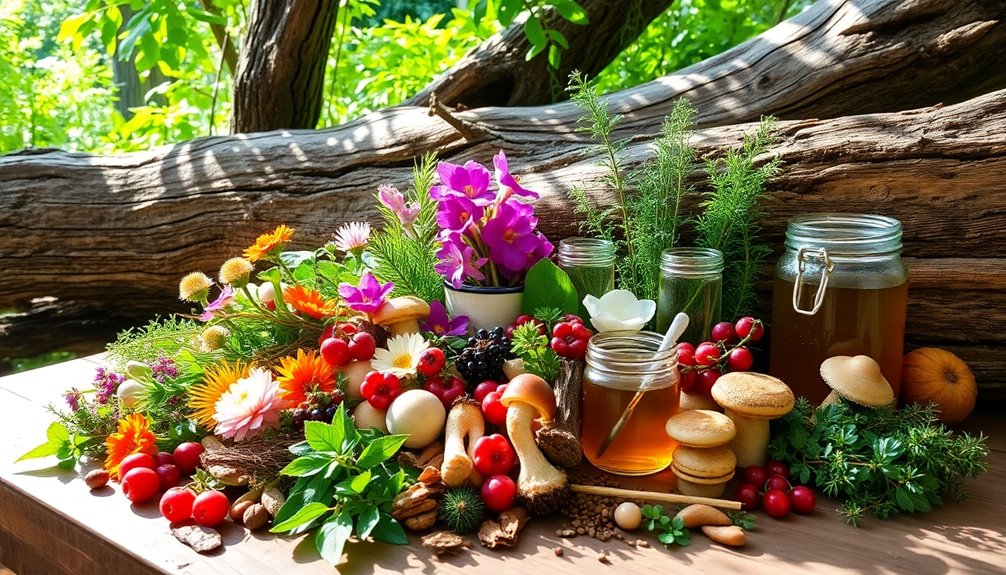
Exploring the world of foraged ingredients opens up exciting avenues for creative food experimentation. When you immerse yourself in foraging, you discover unique edible plants like wild herbs and mushrooms that can elevate your traditional dishes. This not only inspires innovative culinary creations but also introduces you to diverse flavors that enhance meal enjoyment.
Consider these benefits of foraging:
- Revive forgotten recipes with a fresh twist.
- Experiment with seasonal ingredients to promote sustainability.
- Discover new taste experiences, like the sweetness of wild strawberries.
- Connect with local ecosystems through your cooking.
Joining foraging groups can deepen your understanding of these ingredients, encouraging culinary curiosity. You'll learn about the nutritional and flavor profiles of various wild plants, enriching your cooking repertoire.
As you adapt your recipes based on what's available in the wild, you'll find that creative food experimentation becomes a delightful journey. So, get out there, embrace the art of foraging, and let your kitchen creativity flourish!
Independence and Self-Sufficiency

Why rely solely on grocery stores when foraging offers a path to independence and self-sufficiency? When you forage, you gather your own food, reducing your dependence on commercial sources. This shift empowers you, allowing you to take control of your nutritional needs.
The benefits of foraging extend beyond just food; they cultivate a deeper appreciation for the effort that goes into food production. As you explore nature, you develop a connection to the earth and a sense of accomplishment with each successful harvest.
Engaging in foraging activities reinforces your independence. You learn to identify edible plants, mushrooms, and fruits, enhancing your skills and knowledge. This connection to nature fosters respect for agricultural practices and the labor involved in bringing food to your table.
By understanding the effort required to forage, you gain a greater appreciation for the food you consume, leading to a more sustainable lifestyle.
In essence, foraging not only nurtures your body with nutrient-dense foods but also strengthens your self-sufficiency. It empowers you to embrace a lifestyle where you rely less on grocery stores, bringing a profound sense of independence into your life.
Cost Savings From Foraging

Foraging can greatly slash your grocery bills by tapping into a wealth of free food sources in nature. Instead of relying solely on expensive organic produce from stores, you can supplement your diet with nutrient-dense foraged foods. Not only do these ingredients tend to be fresher and more flavorful, but they also enhance your self-sufficiency.
By embracing foraging, you can enjoy significant cost savings and create a more sustainable eating habit. Here are some financial benefits of foraging:
- Access to free food sources reduces overall grocery expenses.
- Foraged foods often outperform store-bought options in taste and nutrition.
- Savings can be redirected towards preserving and preparing food.
- Selling surplus foraged items can generate extra income.
These advantages allow you to cultivate a budget-friendly lifestyle, lessening your dependence on commercial food sources.
As you explore local ecosystems, you'll discover an abundance of edible plants, mushrooms, and berries, all while enhancing your connection with nature. Ultimately, foraging not only nourishes your body but also your wallet, making it a smart choice for anyone looking to boost their financial well-being.
Community Connection and Engagement
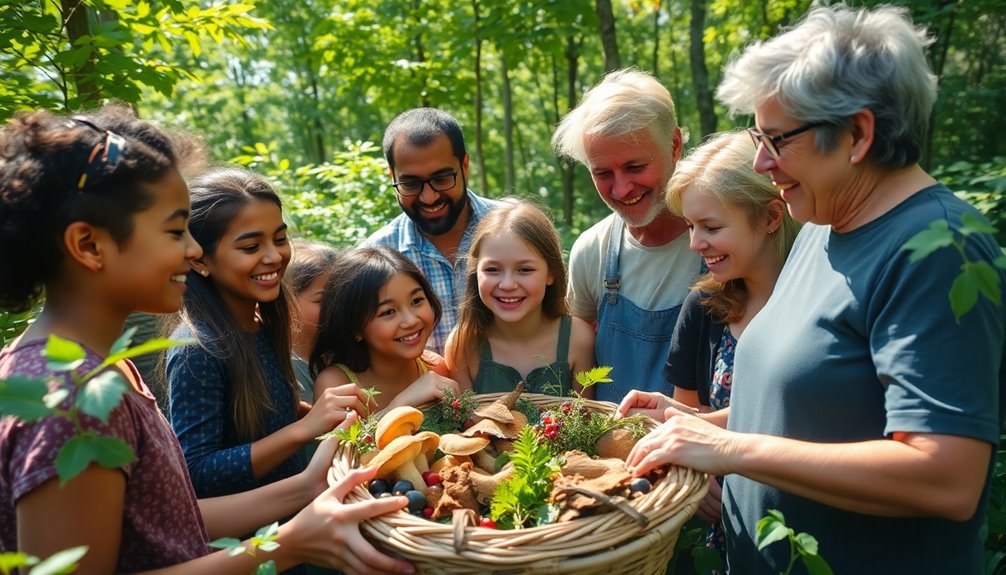
A shared experience in foraging can create strong bonds within your community, fostering relationships that enhance support and knowledge sharing. When you engage in foraging, you're not just gathering food; you're connecting with others who share your interests. This communal activity encourages physical activity, as you explore local landscapes together, making foraging not just a solo endeavor but a group effort.
As you learn from experienced foragers about plant identification and sustainable harvesting, you gain valuable insights while forming a deeper connection with those around you. These local foraging networks proved essential during the COVID-19 pandemic, offering not just food but also a means of social interaction that bolstered mental health.
Participating in these groups cultivates a sense of belonging, as laughter and cooperation become part of the experience. You'll appreciate the cultural exchanges that happen, enriching your understanding of local ecosystems and biodiversity.
Mental Well-being Through Nature
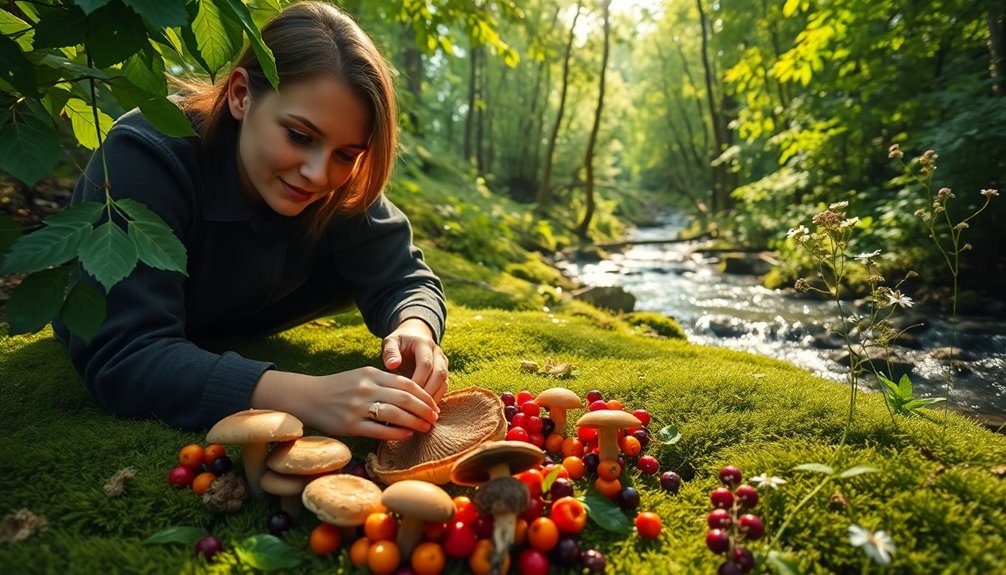
Amid the hustle and bustle of daily life, engaging with nature through foraging can greatly enhance your mental well-being. By spending time outdoors, you foster a deep connection with the environment, which can profoundly reduce stress, anxiety, and depression.
Here's how foraging can benefit your mental health:
- Sense of Accomplishment: Identifying and collecting wild edibles boosts your self-esteem and provides a therapeutic escape from technology.
- Physical Activity: Being active while foraging releases endorphins, improving your mood and overall mental health.
- Social Connections: Foraging often involves communal activities, fostering relationships and support among participants, which are crucial for mental health.
- Cognitive Enhancement: Reconnecting with nature can lead to improved cognitive function and a greater sense of purpose in life.
When you immerse yourself in nature, you not only gather food but also cultivate a sense of well-being. This deep connection with the earth brings clarity and joy, allowing you to recharge your mental batteries.
Frequently Asked Questions
What Is the Importance of Foraging?
Foraging's importance lies in its ability to connect you to nature and your local ecosystem.
You'll discover a variety of native plants that can enrich your diet with fresh, nutritious options.
It fosters community through shared experiences and knowledge, enhancing social bonds.
Plus, foraging can help reduce your grocery bills, making it a sustainable and cost-effective way to eat.
Engaging in this practice promotes self-sufficiency and a deeper appreciation for your environment.
What Is the Golden Rule of Foraging?
The golden rule of foraging is to "leave no trace." This means you should only take what you need and guarantee the ecosystem remains healthy.
Always be certain of your plant identifications, as some edible varieties can look like toxic ones. Respect local regulations and permissions, especially on private land.
Mindful foraging avoids overharvesting and protects sensitive species, allowing you to enjoy nature while preserving it for future generations.
What Is a Fact About Foraging?
"You reap what you sow."
A fascinating fact about foraging is that many wild foods often pack more nutrients than their farmed counterparts. When you forage, you not only connect with nature but also discover vibrant flavors and health benefits that commercial produce might lack.
Plus, foraging encourages you to be mindful of your surroundings, cultivating a deeper appreciation for local ecosystems and the bounty they offer.
What Are the Environmental Benefits of Foraging?
Foraging offers several environmental benefits that you mightn't realize.
By gathering wild foods locally, you cut down on carbon emissions linked to transportation. This practice also supports biodiversity, as it encourages you to consume native plants and maintain local ecosystems.
Additionally, foraging helps reduce food waste by utilizing edible plants often ignored by commercial agriculture.
When you forage ethically, you promote the preservation of natural habitats and contribute to healthier ecosystems.
Conclusion
Incorporating foraging into your life isn't just about finding free food; it's a journey that enriches your health, creativity, and connection to nature. You might think it's time-consuming or intimidating, but with a bit of practice, it becomes an enjoyable adventure. Plus, the satisfaction of harvesting your own ingredients far outweighs any initial hesitation. Embrace the outdoors and discover the surprising benefits of foraging—your palate, wallet, and well-being will thank you!


